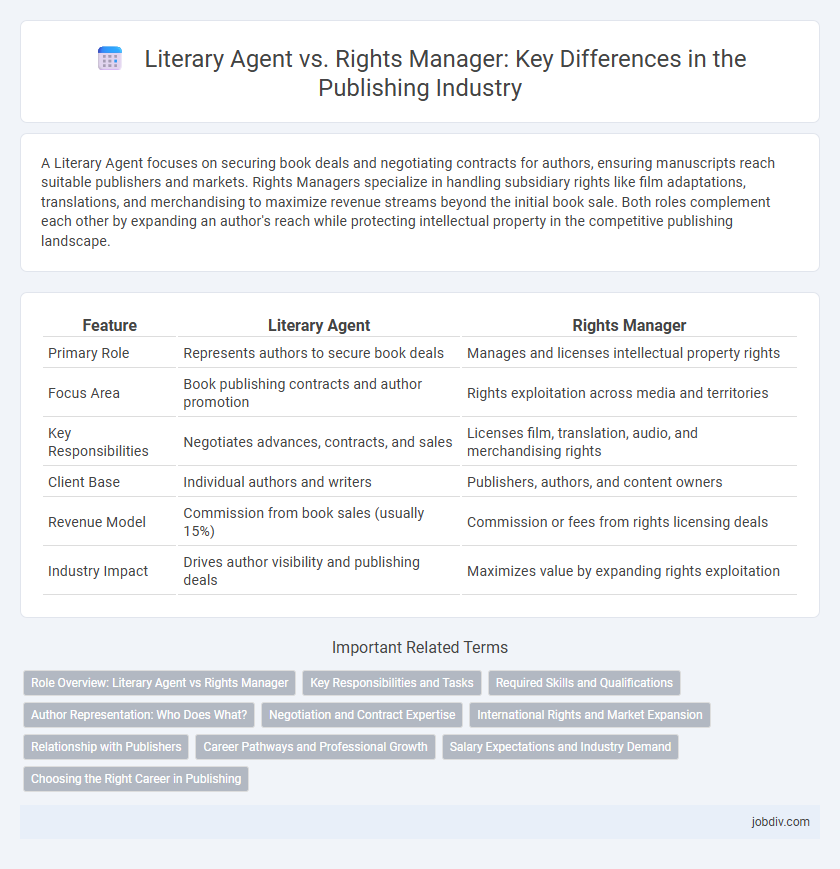A Literary Agent focuses on securing book deals and negotiating contracts for authors, ensuring manuscripts reach suitable publishers and markets. Rights Managers specialize in handling subsidiary rights like film adaptations, translations, and merchandising to maximize revenue streams beyond the initial book sale. Both roles complement each other by expanding an author's reach while protecting intellectual property in the competitive publishing landscape.
Table of Comparison
| Feature | Literary Agent | Rights Manager |
|---|---|---|
| Primary Role | Represents authors to secure book deals | Manages and licenses intellectual property rights |
| Focus Area | Book publishing contracts and author promotion | Rights exploitation across media and territories |
| Key Responsibilities | Negotiates advances, contracts, and sales | Licenses film, translation, audio, and merchandising rights |
| Client Base | Individual authors and writers | Publishers, authors, and content owners |
| Revenue Model | Commission from book sales (usually 15%) | Commission or fees from rights licensing deals |
| Industry Impact | Drives author visibility and publishing deals | Maximizes value by expanding rights exploitation |
Role Overview: Literary Agent vs Rights Manager
A Literary Agent serves as the primary advocate for authors, negotiating book deals and securing publishing contracts to maximize an author's exposure and earnings. In contrast, a Rights Manager specializes in managing and licensing subsidiary rights, such as translations, film adaptations, and merchandising, ensuring additional revenue streams for the intellectual property. Both roles are crucial in the publishing ecosystem, with agents focusing on author representation and initial sales, while rights managers expand the commercial potential of the published works.
Key Responsibilities and Tasks
Literary agents primarily focus on securing book deals, negotiating contracts, and managing author relationships to maximize publishing opportunities. Rights managers specialize in licensing and selling various rights, including translation, film, audio, and merchandising, ensuring revenue streams from diverse markets. Both roles require deep industry knowledge, contract expertise, and strategic negotiation skills to protect and enhance an author's intellectual property.
Required Skills and Qualifications
A Literary Agent requires strong negotiation skills, industry connections, and the ability to identify marketable manuscripts, often holding a degree in literature or communications. Rights Managers need expertise in contract law, intellectual property rights, and multilingual communication skills to effectively manage licensing and rights sales across global markets. Both roles demand excellent interpersonal skills, keen market insight, and a thorough understanding of the publishing industry's ecosystem.
Author Representation: Who Does What?
Literary agents primarily secure book deals and negotiate contracts on behalf of authors, serving as the main liaison with publishers to maximize publishing opportunities. Rights managers focus on managing and licensing subsidiary rights such as film, translation, audiobook, and merchandising to generate additional revenue streams. Both roles are essential in comprehensive author representation, ensuring authors benefit from varied rights exploitation and contract terms.
Negotiation and Contract Expertise
Literary agents specialize in negotiating book deals, advances, and publication contracts, ensuring authors secure favorable terms and royalties. Rights managers focus on managing and negotiating subsidiary rights agreements, including translations, film adaptations, and merchandise licensing. Their contract expertise is critical in maximizing an author's revenue streams and protecting intellectual property across diverse markets.
International Rights and Market Expansion
A Literary Agent primarily secures publishing deals and negotiates contracts for authors within domestic and select international markets, focusing on overall career management. A Rights Manager specializes in the strategic sale and licensing of international rights, facilitating market expansion by targeting specific regions, adapting royalty structures, and coordinating translations and subsidiary rights. Effective collaboration between both roles accelerates global distribution and maximizes revenue streams across diverse publishing territories.
Relationship with Publishers
Literary agents negotiate book deals and manage author-publisher contracts, serving as the primary point of contact for securing publishing agreements. Rights managers specialize in licensing and selling subsidiary rights, such as translation, film, or audio rights, maintaining ongoing relationships with various rights buyers and international publishers. Both roles require strong connections with publishers but differ in scope, with literary agents focusing more on initial contract acquisition and rights managers on maximizing revenue through rights exploitation.
Career Pathways and Professional Growth
Literary agents primarily focus on representing authors to secure book deals with publishers, fostering strong industry connections and negotiation skills crucial for career advancement in publishing. Rights managers specialize in managing and monetizing intellectual property rights across various media, offering expertise in licensing and contract law that enhances professional growth through diversified revenue streams. Both roles provide distinct pathways: agents often transition into publishing or entrepreneurial ventures, while rights managers expand into international markets and multimedia rights, reflecting evolving industry dynamics.
Salary Expectations and Industry Demand
Literary agents typically earn commissions ranging from 15% to 20% of an author's earnings, with annual salaries averaging between $50,000 and $80,000, though top agents can exceed six figures. Rights managers focus on licensing and selling subsidiary rights, often earning salaries from $60,000 to $90,000, reflecting growing demand in global markets like film, TV, and foreign editions. The publishing industry increasingly values rights managers due to the expansion of multimedia adaptations, while experienced literary agents remain essential for author representation and contract negotiation.
Choosing the Right Career in Publishing
Choosing the right career in publishing often depends on whether you prefer representing authors and negotiating book deals as a Literary Agent or managing intellectual property rights and licensing as a Rights Manager. Literary Agents focus on discovering new talent, securing publishing contracts, and advocating for authors, while Rights Managers specialize in maximizing revenue through film, foreign, and translation rights. Understanding these distinct roles helps professionals align their skills and career goals with the dynamic demands of the publishing industry.
Literary Agent vs Rights Manager Infographic

 jobdiv.com
jobdiv.com